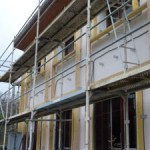The cost of an efficient thermal renovation depends on several aspects : building complexity, amount of works, material and equipment quality, etc. Case studies show that the most efficient approach is a full renovation in one go (insulation, windows, ventilation, heating) at an ambitious level, and that the final cost is not related to the insulation thickness, as extra centimetres cost little and do not require extra work.
For most energy-guzzling buildings in France (houses built before 1975 et not yet renovated, dwellings heated by electricity, etc.), current financial instruments ensure that the upfront investment to renovate is offset by savings on heating bills. For the home owner, it is economical. Yet, to further stimulate investment, it would be necessary to set simpler and more efficient support mechanisms than those currently in place. It would help making deep renovation the standard.
For several millions of French buildings, deep renovation can already be cost-efficient, and as such they should be the priority focus for public policy. A German study has shown that for every Euro spent by the State to trigger and support deep renovation, 7 to 11 Euros of works have been generated, providing in turn 2 to 4 Euros of taxes back to the State.
For other buildings, the likely rise in energy costs in the future will progressively increase the number of deep renovations that become profitable.

